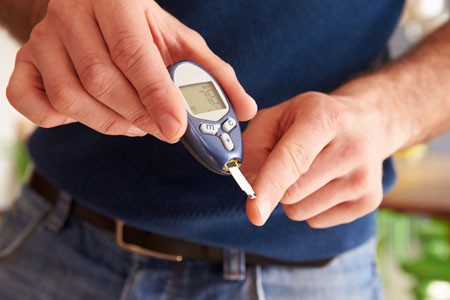Diabetes Complicates Bipolar Disorder
People with bipolar disorder are three times more likely than the general population to develop type 2 diabetes. Type 2 diabetes typically occurs in adulthood and is associated with insulin resistance, as opposed to type 1, which is usually diagnosed in childhood and is associated with insulin deficiency.
In a talk at the 2015 meeting of the Society of Biological Psychiatry, researcher Tomas Hajek reported that in a large group of bipolar patients, 13% reported a history of type 2 diabetes, 21% were diagnosed with type 2 diabetes upon laboratory evaluation, and 32.2% had pre-diabetes without realizing it. Thus, about half of these patients with bipolar disorder were either affected by diabetes or at risk for it, many without knowing it.
The Bad News
Diabetes complicates the course of bipolar illness. Type 2 diabetes is associated with poorer response to treatment, atrophy of the hippocampus, cognitive impairment, and higher rates of conversion from mild cognitive impairment to full-blown dementia.
The main effect of type 2 diabetes is insulin resistance. The body produces enough insulin, but insulin’s effects at its receptors are impaired. Diabetes also causes deficits in growth factors, increases in the enzyme GSK3B, decreases in mitochondria and brain-derived neurotrophic factor (BDNF, which protects neurons), and glucose toxicity.
Recent research by Hajek and colleagues shows that diabetes has several other detrimental effects on the brain in bipolar disorder. On magnetic resonance spectroscopy (MRS) scans, people with type 2 diabetes had lower levels of NAA, a marker of neuronal integrity, in the prefrontal cortex. This can indicate impaired functioning. People with type 2 diabetes also had lower levels of creatine, indicating impaired energy metabolism. In addition, hippocampal volume decreases with aging, and type 2 diabetes accelerated this age-related decline.
Some of diabetes’ effects on the brain are mediated by other health factors, including obesity, cerebral blood vessel disease (which affects white matter integrity), and side effects from medications.
What You Can Do
Start early with a good diet and exercise, and have regular checkups with a doctor, who can tell you if you have diabetes or are at risk for it. If so, start long-term preventative treatment with the most effective and easy-to-tolerate medications, and periodically have your fasting blood sugar tested. If these tests are abnormal, have your hemoglobin A1c (HbA1c) checked. This is a measure of good glucose control, and should be under 6. If it creeps upward toward 6 (a sign of pre-diabetes), the drug metformin may be able to prevent the onset of type 2 diabetes. If you have type 2 diabetes, there are several types of effective medications that can minimize its effects.
Diabetes May Contribute to Low Hippocampal Volume in Bipolar Disorder
Type 2 diabetes can damage the brain, particularly by reducing volume of the hippocampus, and frequently occurs in patients with bipolar disorder. A recent study of patients with bipolar disorder and abnormal glucose metabolism showed that patients with bipolar disorder who also had insulin resistance, glucose intolerance, or type 2 diabetes had smaller hippocampi than both patients with bipolar disorder and normal glucose function and normal control participants without a psychiatric disorder. In those with bipolar disorder and glucose abnormalities, age was associated with lower hippocampal volume to a greater extent than in bipolar patients with normal glucose function.
In the study, published by Tomas Hajek et al. in the journal Neuropsychopharmacology, not only did diabetes or prediabetes reduce the size of the hippocampus, but also reduced gray matter in the cerebral cortex, including the insula.
The researchers hope that treating diabetes, or possibly even its initial symptoms, more effectively may prevent these gray matter losses and slow brain aging in patients with bipolar disorder.



